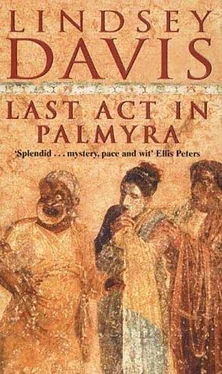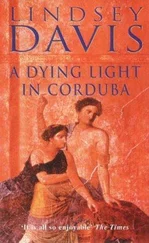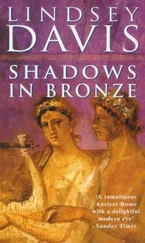Lindsey Davis - Last Act In Palmyra
Здесь есть возможность читать онлайн «Lindsey Davis - Last Act In Palmyra» весь текст электронной книги совершенно бесплатно (целиком полную версию без сокращений). В некоторых случаях можно слушать аудио, скачать через торрент в формате fb2 и присутствует краткое содержание. Жанр: Исторический детектив, на английском языке. Описание произведения, (предисловие) а так же отзывы посетителей доступны на портале библиотеки ЛибКат.
- Название:Last Act In Palmyra
- Автор:
- Жанр:
- Год:неизвестен
- ISBN:нет данных
- Рейтинг книги:5 / 5. Голосов: 1
-
Избранное:Добавить в избранное
- Отзывы:
-
Ваша оценка:
- 100
- 1
- 2
- 3
- 4
- 5
Last Act In Palmyra: краткое содержание, описание и аннотация
Предлагаем к чтению аннотацию, описание, краткое содержание или предисловие (зависит от того, что написал сам автор книги «Last Act In Palmyra»). Если вы не нашли необходимую информацию о книге — напишите в комментариях, мы постараемся отыскать её.
Last Act In Palmyra — читать онлайн бесплатно полную книгу (весь текст) целиком
Ниже представлен текст книги, разбитый по страницам. Система сохранения места последней прочитанной страницы, позволяет с удобством читать онлайн бесплатно книгу «Last Act In Palmyra», без необходимости каждый раз заново искать на чём Вы остановились. Поставьте закладку, и сможете в любой момент перейти на страницу, на которой закончили чтение.
Интервал:
Закладка:
For one thing, the people were unashamedly wealthy and enjoyed showing off. Nothing had prepared us for the brightness of the linens and silks with which every Palmyrene of any standing was adorned. The rich weaves of their cloth were unlike any produced further west. They liked stripes, but never in plain bands of colour. Their materials were astonishing feasts of elaborate brocaded patterns, studded with flowers or other dainty emblems. And the threads used for these intricate weaves were dyed in spectacular varieties of purples, blues, greens and reds. The colours were deep and warm. The hues in the streets were a dramatic contrast to any public scene in Rome, which would be a monochrome of scarcely modulated grades of white, broken only by the vibrant purple bands that designate high status.
The men here would have looked effeminate in Rome. It took some getting used to. They all wore tunics laden with splendidly embroidered braid; beneath were swathed Persian trousers, again richly hemmed. Most men wore straight-sided, flat-topped hats. Female dress consisted of conventional long gowns, covered by cloaks caught on the left shoulder by a heavy brooch. Veils were routinely worn by all women except slaves and prostitutes. The veil, ostensibly protecting the ownership of a strict father or husband, fell from a tiara or turban, and was then left loose as a frame to the face, allowing the owner to manipulate its folds attractively with one graceful hand. What could be glimpsed behind the pretence of modesty were dark curls, chubby chins, huge eyes and strong-willed mouths. The women were broad in the beam and all wore as many necklaces, bangles, rings and hair jewels as they could cram on; no wench with less than six neck-chains could be considered worth talking to. Getting them to talk might be difficult, however, due to the looming presence of jealous menfolk and the fact they all went about with dogged chaperones.
Philocrates did very quickly manage to make the acquaintance of a creature in lavish pleats of azure silk, crushed under eight or nine gold necklaces from which dangled an array of pendants set with pearls and polished glass. Her arms were virtually armoured with metal bracelets. We watched her peep at him entrancingly from behind her veil, only one lovely eye revealing itself. Maybe she was winking. Shortly afterwards we were watching him being chased down the street by her relatives.
There was supposed to be a theatre, so while Chremes tried to find it and find out whether rude Roman vagabonds like us could appear there, I set off to discover the missing girl, Sophrona. I had asked Thalia whether she wanted to come with me.
'No. You go and make a fool of yourself first, then we'll put our heads together once you know what the situation is.'
'That's good. I had thought that with you in Syria I was going to lose my fee.'
'You can't lose what you never earned, Falco. The fee is for getting her back to Rome. Don't waste your ink on an invoice until she's off the boat at Ostia!'
'Trust me.' I smiled.
Helena laughed. I touched her forehead, which at long last was cooler. She was feeling much better. I could tell that when she gaily explained to Thalia, 'It's sweet really. Poor Marcus, he likes to convince himself he has a way with girls.'
I leered like a man who should never be allowed out alone; then, feeling fonder than ever of Helena, I set off into town.
I seemed to remember hearing that this Sophrona was i beauteous bit of stuff.
Chapter LXIII
It had seemed best to deal with Thalia's task quickly, before Chremes called upon my services as his luckless author. Besides, I was happy to pack in some sightseeing.
If you visit Palmyra, go in Spring. Apart from the cooler weather, April is when they hold the famous processions at the great Temple of Bel. In any other month you get sick of people telling you how wonderful the festival is, with its minstrels, its palanquins of deities, and its lengthy processions of garlanded animals. Not to mention the subsequent blood-letting. Or the breakdown of social order that inevitably follows serious religion. The festival (to be regarded askance by a sober Roman, though it sounded good fun to me) must have been taking place about the time Helena and I were planning our trip. It offers the only chance of seeing open the mighty portals that hold back the public from the triad in the inner sanctuary, so if you like gaping at gods or at fabulous stonework, April is a must. Even then it's a slim chance, due to the secrecy of the priests and the vast size of the crowds.
In August you can only wander around the immense courtyard like a water flea lost in Lake Volusinus, being told by everyone what a treat you missed earlier. This I did myself. I sauntered between the altar and the lustral basin, mighty examples of their kind, then stared sadly at the closed doors in the immensely high and opulently decorated entrance porch. (Carved monolithic beams and stepped merlons, in case you wanted to know.) I had been told that the inner sanctum was an architectural wonder. Not much use for adding tone to your memoirs if it's shut.
The other reason for not going to Palmyra in August is the unbearable heat and brightness. I had walked all the way across town from our camp outside the Damascus Gate. I strolled from the Temple of Allath – a severe goddess guarded by a ten-foot-high lion with a jolly countenance, who sheltered a lithe gazelle – to the far end of town where the Temple of Bel housed the Lord of the Universe himself, plus two colleagues, a moon-god and a sun-god, named Aglibol and Yarhibol. The profusion of deities honoured in this city made the twelve gods of Roman Olympus look a meagre picnic party. As most of the temples in Syria are surrounded by huge open-air courtyards that act as suntraps, each of Palmyra's hundreds of divinities was baking, even inside his darkly curtained-offadyton. However, they were not as hot as the poor fools like me who had risked marching about the city streets.
The sulphurous springs were low in their cistern, the gardens surrounding them reduced to sticks and struggling succulents. The odour of hot therapeutic steam was no match for the pervading wafts of a city whose major imports were heady perfume oils. Brilliant sunlight zinged off the dirt roads, lightly poached the piles of camel dung, then wrapped its warmth around thousands of alabaster jars and goatskin bottles. The mingling fragrances of heated Oriental balms and fine oils choked my lungs, seeped into my pores and hung about the crumples of my robes.
I was reeling. My eyes had already been dazzled by tottering piles of bronze plaques and statues, endless bales of silks and muslins, the deep shine of jade and the dark green glimmer of Eastern pottery. Ivory the size of forest logs was piled haphazardly alongside stalls selling fats or dried meat and fish. Tethered cattle awaited buyers, bellowing at the merchants selling multicoloured heaps of spice and henna, Jewellers weighed out pearls in little metal scales as casually as Roman sweetsellers toss handfuls of pistachio nuts into wrapping cones of remaindered songs. Minstrels, tapping hand-drums, intoned poetry in languages and measures I could not begin to comprehend.
Palmyra is a mighty emporium; it depends on helping visitors secure contracts. In the packed streets even the busiest traders were prepared to stop and hear about my quest. We could understand each other's Greek, just about. Most tried to point me where I should be going. Once I had been marked as a man with a mission, they insisted on helping. Small boys were sent running to ask other people if they knew the address I was looking for. Old fellows bent double over knobby sticks tottered up twisting lanes with me to check possible houses. I noticed that half the population had terrible teeth, and there was a bad epidemic of deformed arms. Maybe the hot springs were not all that medicinal; maybe the sulphuric spring water even caused these deformities.
Читать дальшеИнтервал:
Закладка:
Похожие книги на «Last Act In Palmyra»
Представляем Вашему вниманию похожие книги на «Last Act In Palmyra» списком для выбора. Мы отобрали схожую по названию и смыслу литературу в надежде предоставить читателям больше вариантов отыскать новые, интересные, ещё непрочитанные произведения.
Обсуждение, отзывы о книге «Last Act In Palmyra» и просто собственные мнения читателей. Оставьте ваши комментарии, напишите, что Вы думаете о произведении, его смысле или главных героях. Укажите что конкретно понравилось, а что нет, и почему Вы так считаете.












